八年级英语下册Unit1PastandPresent知识点总结及测试卷新版牛津版
八年级英语下册 Unit 1 Past and present语法点拨 牛津版

Unit 1 Past and present一、教学内容:Unit 1 Past and present Language points二、教学目标:掌握课文中的重点语言点及用法1. He used to live in Nanjing.他过去住在某某。
used to do something. 表示“过去常常做某事”be used to doing something表示“习惯于做某事”be used to do 表示“被用来做某事”,主语常常是物。
e.g. ①. I used to get up at 6 o’clock. But now I often get up at 7 o’clock.②. We are used to reading English very early in the morning.③. A knife is used to cut something.(1) My grandmother________ a history teacher in a middle school.(过去曾是)(2) ________ you ________in Beijing now?(习惯住在)(3) Mobile phones________ municate with other people. (被用来)2. We lived together until 1965 when I got married. 我们一起住直到1965年我结婚。
1) till ( prep& conj. 介词/连词) 和until类似,常用于口语中,但不可用在句首。
肯定句(谓语动词是延续性的)+ till… “到……为止”I will stay here till 6:00 p.m. then I will go.否定句not(谓语动词是短暂性的)+ till… “直到……才……”He didn’t leave till it rained heavily.句首只能用untilUntil he returns, I can do nothing.他不回来,我什么也不能做。
2020年牛津译林版八年级英语下册Unit1单词词组和语法讲解+训练
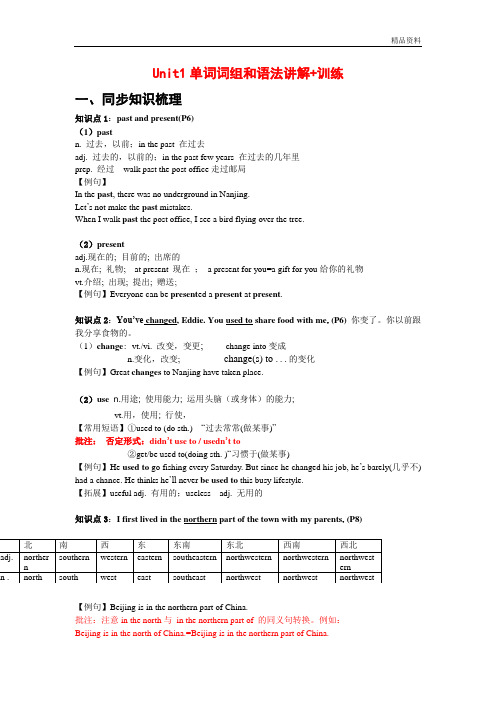
Unit1单词词组和语法讲解+训练一、同步知识梳理知识点1:past and present(P6)(1)pastn. 过去,以前;in the past 在过去adj. 过去的,以前的;in the past few years 在过去的几年里 prep. 经过 walk past the post office 走过邮局 【例句】In the past , there was no underground in Nanjing. Let ’s not make the past mistakes.When I walk past the post office, I see a bird flying over the tree.(2)presentadj.现在的; 目前的; 出席的n.现在; 礼物; at present 现在 ; a present for you=a gift for you 给你的礼物 vt.介绍; 出现; 提出; 赠送;【例句】Everyone can be present ed a present at present .知识点2:You’ve changed, Eddie. You used to share food with me .(P6) 你变了。
你以前跟我分享食物的。
(1)change : vt./vi. 改变,变更; change into 变成 n.变化,改变; change(s) to ...的变化 【例句】Great changes to Nanjing have taken place.(2)use n.用途; 使用能力; 运用头脑(或身体)的能力;vt.用,使用; 行使,【常用短语】①used to (do sth.) “过去常常(做某事)” 批注: 否定形式:didn ’t use to / usedn ’t to②get/be used to(doing sth. )“习惯于(做某事)【例句】He used to go fishing every Saturday. But since he changed his job, he ’s barely(几乎不) had a chance. He thinks he ’ll never be used to this busy lifestyle. 【拓展】useful adj. 有用的;useless adj. 无用的知识点3:I first lived in the northern part of the town with my parents .(P8)【例句】Beijing is in the northern part of China.批注:注意in the north 与 in the northern part of 的同义句转换。
牛津译林版 8B八年级下册 Unit1 Past and present 知识点梳理
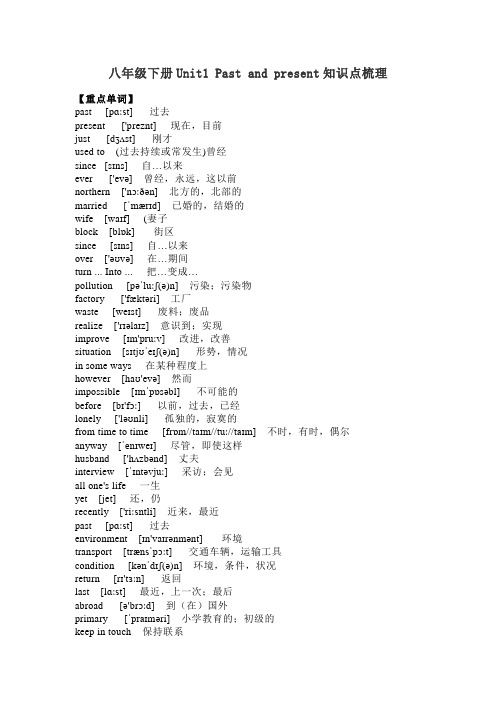
八年级下册Unit1 Past and present知识点梳理【重点单词】past [pɑːst]过去present ['preznt] 现在,目前just [dʒʌst] 刚才used to (过去持续或常发生)曾经since [sɪns] 自…以来ever ['evə] 曾经,永远,这以前northern ['nɔːðən] 北方的,北部的married [ˈmærɪd] 已婚的,结婚的wife [waɪf] (妻子block [blɒk] 街区since [sɪns] 自…以来over ['əʊvə] 在…期间turn ... Into ... 把…变成…pollution [pəˈluːʃ(ə)n] 污染;污染物factory ['fæktəri] 工厂waste [weɪst] 废料;废品realize ['rɪəlaɪz] 意识到;实现improve [ɪm'pruːv]改进,改善situation [sɪtjʊˈeɪʃ(ə)n] 形势,情况in some ways 在某种程度上however [haʊ'evə] 然而impossible [ɪmˈpɒsəbl] 不可能的before [bɪ'fɔː]以前,过去,已经lonely ['ləʊnli] 孤独的,寂寞的from time to time [frɒm//taɪm//tuː//taɪm] 不时,有时,偶尔anyway [ˈenɪweɪ] 尽管,即使这样husband ['hʌzbənd] 丈夫interview [ˈɪntəvjuː]采访;会见all one's life 一生yet [jet] 还,仍recently ['riːsntli]近来,最近past [pɑːst]过去environment [ɪn'vaɪrənmənt] 环境transport [trænsˈpɔːt]交通车辆,运输工具condition [kənˈdɪʃ(ə)n] 环境,条件,状况return [rɪ'tɜːn]返回last [lɑːst]最近,上一次;最后abroad [ə'brɔːd]到(在)国外primary [ˈpraɪməri] 小学教育的;初级的keep in touch 保持联系communicate [kəˈmjuːnɪkeɪt] 交流,交际communication [kəmjuːnɪˈkeɪʃ(ə)n] 交流,交际exactly [ɪg'zæktli] (答语)正是,没错be/get used to 习惯于,适应于narrow [ˈnærəʊ] 狭窄的open space 开阔的空地【重点词组】1.in the bowl an hour ago一个小时之前在碗里的ed to do sth.过去常常做某事be used to doing sth. 习惯于做某事be used to do sth. 被用来做某事3.do a history project on the changes in Beijing over the years做个有关这些年北京的变化的历史调查4.write a report on the changes in your home town 写一个有关你家乡的变化的报道5.know about the different forms of transport 对不同形式的交通工具很了解6.talk about transport at different times 讨论不同时期的交通工具7.take turns to do sth.=do sth. by turns 轮流做某事8.go to school by bike = ride a bike to school 骑自行车去学校9.wait for the next one 等下一辆车10.go to school by bus= take a bus to school= go to school on the bus乘公交车去学校11.interview sb. to get some information 为了得到些信息采访某人12.know sunshine town very well 对阳光镇很了解13.be born 出生14.move house 搬家15.in the northern part of town 在这个镇的西部16.get married to sb.= marry sb.= be married to sb.和某人结婚17.marry sb. to sb. 把某人嫁给某人18.move two blocks away搬到两个街区以外19.live in this area 住在这个地区20.since then 自从那以后since I was born/ since last Saturday/since three days ago21.over the years 这些年over the past century 在过去的几个世纪22.in the town centre= in the centre of the town 在镇中心23.turn/change/put sth. into 把某物变成某物24.a steel factory 一个钢铁厂25.put the waste into the river 把垃圾倒入河里put down 记下put away 收好put on 穿上put off 推迟、延期26.take action to improve the situation采取行动改善这种情况27.in some ways 在某些方面on the way (to ) 在……的路上by the way 顺便说no way 没门in any way 无论如何28.most of my old friends大部分我的老朋友29.move away 搬走/move to(into) another town30.see each other as often as before像以前一样经常看到对方31.play cards and Chinese chess 打牌和下棋32.feel a bit lonely 感到有点孤单33.from time to time = at times = sometimes 有时34.because of being alone 因为独自一人35.a group of buildings with streets on all sides街道两边全是高楼on both sides/ on each side36.interview sb.= have an interview with sb. 采访某人37.all his life 整个他的一生38.in the past 在过去at present 现在39.make some notes 做些笔记40.waste sth. on sth./ sb.浪费某物在某物/某人上41.repair over ten bicycles= repair more than ten bicycles修理超过10辆自行车42.teach sb. a lot about the history of China教我很多有关中国的历史43.talk about a film about the history of Beijing讨论一个有关北京历史的影片44.learn more about Beijing’s past and present对北京的过去和现在了解更多45.hear about/of 听说hear from sb.= receive/ get one’s letter=receive/get a letter of sb.收到某人来信46.living conditions 居住条件47.return sth. to sb. 把某物归还给某人48.go abroad 去国外at home or abroad 在国内外49.at primary school 在小学50.keep in touch with each other 互相保持联系51.make communication much easier使得联系更容易Communicate with sb.和某人保持联系52.take place发生(有目的有计划的)、举行happen发生(偶然发生)53.green hills all around到处都是绿山54.a river runs through the centre of town一条小河穿过镇中心55.get used to the changes of life习惯了生活的变化56.on one’s own = by oneself = alone独自57.throw rubbish 扔垃圾58.in some large open spaces在一些大的开阔的地方59.move into new flats搬到新公寓去60.in their free time在他们业余时间61.travel around the town在镇里转转62.have their own cars= have cars of their own有他们自己的汽车e the new words to talk about my hometown用些新词来讨论我的家乡e facts to support my opinions用事实来支持我的观点【重点句型】1.There were always too many people on the bus, and it took a long time to wait for the next one.公共汽车上总是有太多的人,并且要花费很长时间等待下一趟。
八年级英语下册 Unit 1 Past and present词汇与语法基础训练 (新版)牛津版

Unit 1 Past and present 知识精讲一、必背词汇past n. 过去 adj.过去的present n. 现在,目前just adv. 刚才since conj. 自……以来 prep.自……以来ever adv. 曾经northern adj. 北方,北部的married adj. 已婚的,结婚的wife n.(pl. wives) 妻子block n.街区over prep. 在……期间pollution n. 污染;污染物factory n. 工厂waste n. 废料;废品realize (= realise )vt.& vi.意识到;实现improve vt.&vi. 改进,改善situation n. 形势,情况impossible adj. 不可能的2 2 before adv.以前,过去lonely adj. 孤独的,寂寞的anyway adv. 尽管,即使这样husband n. 丈夫interview n. 采访;会见yet adv. 还,仍recently adv.近来,最近environment n. 环境transport n.交通车辆,运输工具condition n. 环境,条件,状况return vi. 返回last adv.最近,上一次;最后abroad adv. 到(在)国外primary adj. 小学教育的;初级的communicate vt. &vi. 交流,交际exactly adv.(答语)正是,没错narrow adj. 狭窄的二、重点词汇1. present noun /ˈprez.ənt/1). something that you are given, without asking for it, on a specialoccasion, especially to show friendship, or to say thank you(尤指表示友谊或致谢的)礼物,赠品例句: They gave me theatre tickets as a present.他们送给我戏票作为礼物。
八年级英语下册:Unit 1 Past and present第一轮知识点复习(译林牛津版)

Unit 1 Past and present一.重点单词1.marry sb/get married to /be married to/marry sb to sb2.past(1)n. in the past(2) adv. They went past just now.(3) adj in/during the past few years)(4) prep. It’s half past two.(c.f. passed)3.present n.(1)=gift (2) at presentv. present sb with sth ( presentation)adj. not absent4. over (1)prep. (1)all over the world(2)=more than(3) (c.f. above, on)(4) over the past 100 years(2)adv. be overPhrases: over and over again, come over, all over,go over,over again5. times:at different times;three times a day; at times;The New York Times6.south(n.) southern(adj.) : in the southern part of the town7.turn: v.turn round;turn left/right; turn gray; turn into;turn up/down; turn on/offn. take turns to do sth; It’s one’s turn to do sth; wait for one’s turn8. alone (c.f. lonely)9. used to; be used to do sth; be used to doing sth10. waste: v. waste time doing sthn. dump waste into the river; It’s a waste of time to do sth11.poison (n.) poisonous (adj.)12.pollute: (v) pollute the air/water pollution(n.) air pollution13.in some ways;in many ways;in the way; on the way to…; by the way14.a bit (c.f. a little)15.throw:( throw-threw-thrown) throw away; throw at…16.interview: (interview sb;have/give an interview with sb.)17.luck: (c.f. lucky,unlucky, luckily, unluckily)good luck to sb, good luck with sth18.unpleasant: (c.f. please,pleased, pleasing, pleasant, unpleasant, pleasure)19.unhealthy: (c.f. health, healthy,healthily,healthier)20.own: (v.) own a shop owner(adj.) my own bookon one’s own, of one’s own21.develop: ( developed, developing, development)22. lend: (lend-lent-lent) (c.f. borrow)23.attraction: (attract, attractive, attraction) a tourist attraction24.since(1) +Clause He hasn’t been home since he graduatedSince you are nit interested, I won’t tell you about it.(2)+n. They have been friends since childrenhood.ever since (c.f. since then)since/for二.重点短语1. not…any more2. play with3.at different times4. get married5.move to /out of/in /into6.in the centre of town7.change a lot over the years 8.in the past9.turn the place into a park 10.play cards and Chinese chess 11.a shoe factory 12.water pollution13.dump the waste into the river 14.pollute the river15.take action to do sth 16.reduce the pollution17.better than before 18.in some ways19.feel a bit lonely 20. from time to time21.throw away 22. have an interview with…23.in primary school 24.be in use/service25.cause many problems for people 26.a tourist attraction27. move house 28.have open space29. bring sb. a modern life 30.as good as before31.know sb/sth very well 32.market stalls33. as often as before 34.write an article on…35.tell sb a lot about… 36. be lucky enough to see the changes to sp37.future plan 38.on one’s own39.show you how to get to… 40. bring many advantages三.重点句型1. Now the government has turned the place intoa park,and we have a large shopping mall and a theatre too.2.The town has changed a lot over the years=Great changes have taken place in the town over the years=There have been great changes in the town over the years.3.The pollution was terrible then because the factory used to dump its wasteinto the river4. It’s nice to have open space and pretty gardens.5. They have moved to other areas in Beijing, and I feel a bit lonely from time to time.ter, the government realized it was a serious problem and took action to reduce the pollution.7. I had an interview with Daniel’s grandpa this morning.8.It’s difficult for him to see some of them as often as bofore.9. I must say that it’s the best model I have ever seen10. There are now many new words, new buildings and a lot more people.11.Today, Daniel lent me a book about Starlight Town in the past and the present.12.The changes to Moonlight Town have brought many advantages, but they have also caused many problems for people.13. I’m happy that she has time to relax more.四.语法知识1.现在完成时的概念,结构以及在各种句式中的运用基本结构为have/has+过去分词(1)表示过去发生的行为,动作,情况对现在的影响或造成的结果。
八年级英语下册 Unit 1 Past and present知识点复习 牛津版

Unit 1 Past and present词汇短语1. -- How well do you know Sunshine Town…?-- I know the place very well.问到对某人/物/地有多少程度的了解时,用“How well… know…?” 来提问。
e. g: (1)你对美国的历史有怎样的了解啊?How well do you know the history of America?I know it _________. (well; a little)(2)She knew China a little. (划线部分提问)____ ____ _____ she know China?2. I moved here with my family when I was two years old and have lived here since then.since: prep& conj. (介词或连词)从……以来可以用来连接一个时间点或一个句子,常用于现在完成时中We have been good friends since 1993.We have known each other since we studied in the primary school.3. I first lived near Sunshine River in the southern part of town with my parents.first adv. 起初,首先first; then; later; afterwards; finallyfirst; second; third…southern part=southsouthernwesterneasternnorth-westernnorth-easternsouth-easternsouth-western4. We lived together till 1965, when I got married.1) till ( prep& conj. 介词/连词) 和until类似,常用于口语中,但不可用在句首。
Unit+1+Past+and+present知识点整理 牛津译林版英语八年级下册
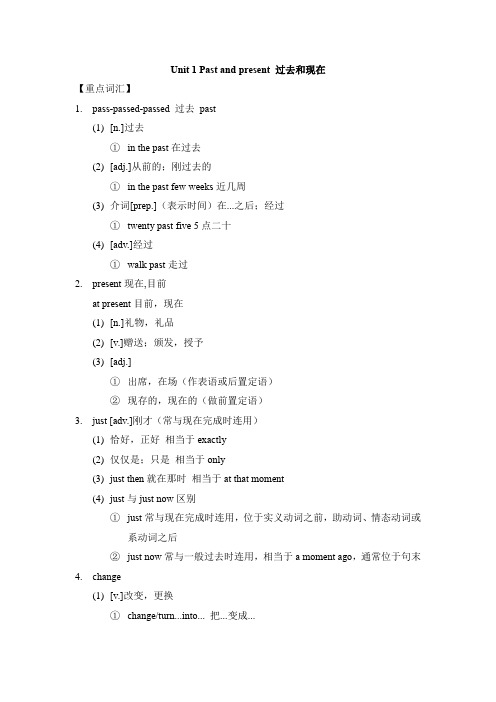
Unit 1 Past and present 过去和现在【重点词汇】1.pass-passed-passed 过去past(1)[n.]过去①in the past在过去(2)[adj.]从前的;刚过去的①in the past few weeks近几周(3)介词[prep.](表示时间)在...之后;经过①twenty past five 5点二十(4)[adv.]经过①walk past走过2.present现在,目前at present目前,现在(1)[n.]礼物,礼品(2)[v.]赠送;颁发,授予(3)[adj.]①出席,在场(作表语或后置定语)②现存的,现在的(做前置定语)3.just [adv.]刚才(常与现在完成时连用)(1)恰好,正好相当于exactly(2)仅仅是;只是相当于only(3)just then就在那时相当于at that moment(4)just与just now区别①just常与现在完成时连用,位于实义动词之前,助动词、情态动词或系动词之后②just now常与一般过去时连用,相当于a moment ago,通常位于句末4.change(1)[v.]改变,更换①change/turn...into... 把...变成...(2)[n.]变化,变革;零钱(不可数名词)5.since[conj.]&[prep.]自……以来6.ever[adv.]曾经7.northern北方的,北部的southern western eastern8.married已婚的,结婚的(1)get married结婚(2)be married已婚(3)be/get married to sb.与某人结婚9.wife妻子-wives[pl.](1)knife-knives(2)wolf-wolves(3)thief-thieves(4)half-halves(5)leaf-leaves10.away[adv.]离开,在(某距离)处(1)go away离开(2)right away立刻(3)take away带走(4)run away逃离(5)put away收起来(6)far away远离(7)keep...away from... 使...远离...11.block街区12.pollution污染;污染物(1)[v.]pollute(2)light pollution光污染(3)air pollution空气污染(4)water pollution水污染(5)noise pollution噪声污染13.problem[n.]问题,难题(1)question与ask/answer(2)problem难以解决问题solve/work out连用14.factory工厂15.waste(1)废料;废品(不可数名词)(2)[n.]浪费,可以和冠词a连用(3)[adj.]废弃的,无用的;荒芜的(4)[v.][新义]浪费,滥用①waste sth. on sth.浪费某物在某物/事上②waste sth. (in) doing sth.浪费某物做某事16.realize[v.]意识到;实现(1)realize实现,是及物动词,被实现(2)come true实现,成为现实,是不及物动词,不能用于被动语态17.situation形势,情况18.husband丈夫19.impossible[adj.]不可能的(1)impossibly[adv.](2)possible[adj.]-possibly[adv.](3)possibility[n.]可能性20.interview采访;会见[新义]n.对……进行面试;采访21.environment环境condition环境,条件,状况22.lonely和alone(1)lonely形容词孤独的,强调人的内心感受;偏僻的。
Unit 1 Past and Present Revision知识点复习巩固 牛津译林版八年级英
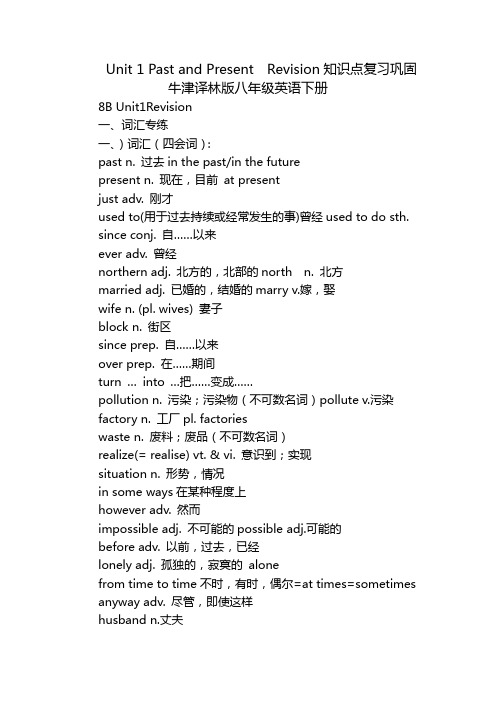
Unit 1 Past and Present Revision知识点复习巩固牛津译林版八年级英语下册8B Unit1Revision一、词汇专练一、)词汇(四会词):past n. 过去in the past/in the futurepresent n. 现在,目前at presentjust adv. 刚才used to(用于过去持续或经常发生的事)曾经used to do sth. since conj. 自……以来ever adv. 曾经northern adj. 北方的,北部的north n. 北方married adj. 已婚的,结婚的marry v.嫁,娶wife n. (pl. wives) 妻子block n. 街区since prep. 自……以来over prep. 在……期间turn …into …把……变成……pollution n. 污染;污染物(不可数名词)pollute v.污染factory n. 工厂pl. factorieswaste n. 废料;废品(不可数名词)realize(= realise) vt. & vi. 意识到;实现situation n. 形势,情况in some ways在某种程度上however adv. 然而impossible adj. 不可能的possible adj.可能的before adv. 以前,过去,已经lonely adj. 孤独的,寂寞的alonefrom time to time不时,有时,偶尔=at times=sometimes anyway adv. 尽管,即使这样husband n.丈夫interview n.采访;会见interview v.采访;会见have an interview with sb.=interview sb.all one’s life一生yet adv. 还,仍recently adv. 近来,最近recent adj. 近来的,最近的past adj. 过去的environment n. 环境(不可数名词)condition n. 环境,条件,状况return vi. 返回=go backlast adv. 最近,上一次;最后abroad adv. 到(在)国外primary adj. 小学教育的;初级的keep in touch保持联系keep in touch with sb.communicate vi. & vt. 交流,交际communication n. 交流,交际exactly adv.(答语)正是,没错exact adj. 精确的,准确的be/get used to 习惯于,适应于be/get used to sth. /doing sth.open space n. 开阔的空地二、)词语辨析:ed to do sth.// be/get used to sth./doing sth.// be used to do sth// use sth. to do sth.// be used for sth./doing sth1).used to do sth. 过去常常做某事He used to go there. But now, he seldom go there.2).be/get used to sth./doing sth.习惯于做某事He has got used to new environments.3).be used to do sth.被用来做某事.= be used for sth./doing sth.The quilt is used to keep warm.= The quilt is used for keeping warm.4). use sth. to do sth. 用……做……They use the quilt tokeep warm.2.situation/environment/condition/state1).situation:意思是“形势,情况”,多指国家的政治局势,经济状态等。
Unit1 Past and Present课堂知识点重点笔记讲义 牛津译林版八年级英语下册
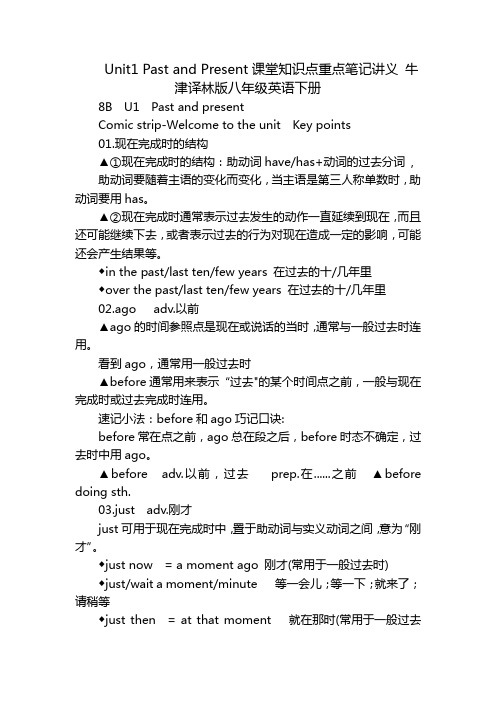
Unit1 Past and Present课堂知识点重点笔记讲义牛津译林版八年级英语下册8B U1 Past and presentComic strip-Welcome to the unit Key points01.现在完成时的结构▲①现在完成时的结构:助动词have/has+动词的过去分词, 助动词要随着主语的变化而变化,当主语是第三人称单数时,助动词要用has。
▲②现在完成时通常表示过去发生的动作一直延续到现在,而且还可能继续下去,或者表示过去的行为对现在造成一定的影响,可能还会产生结果等。
◆in the past/last ten/few years 在过去的十/几年里◆over the past/last ten/few years 在过去的十/几年里02.ago adv.以前▲ago的时间参照点是现在或说话的当时,通常与一般过去时连用。
看到ago,通常用一般过去时▲before通常用来表示“过去"的某个时间点之前,一般与现在完成时或过去完成时连用。
速记小法:before和ago巧记口诀:before常在点之前,ago总在段之后,before时态不确定,过去时中用ago。
▲before adv.以前,过去prep.在......之前▲before doing sth.03.just adv.刚才just可用于现在完成时中,置于助动词与实义动词之间,意为“刚才”。
◆just now = a moment ago 刚才(常用于一般过去时)◆just/wait a moment/minute 等一会儿;等一下;就来了;请稍等◆just then = at that moment 就在那时(常用于一般过去时)[单选常考混淆辨析]A.ever 曾经B. never 从不C.just 刚才D.still 仍然;依旧[联想拓展]→just = only adv.(加强语气)正好;仅仅,只不过→just adj.公正的;合适的ed to do sth.▲used to do sth. 过去常常做某事,表示过去经常性、反复性或习惯性的动作或状态,暗含的意思为“过去经常这样做,但现在却不这样做了"。
[初二英语]英语Unit 1 Past and present重点语法和句型(译林牛津八年级下)
![[初二英语]英语Unit 1 Past and present重点语法和句型(译林牛津八年级下)](https://img.taocdn.com/s3/m/f92237f0195f312b3169a560.png)
Unit 1 Past and present一. 教学内容:Unit 1 Past and presentwords, phrases and sentences二. 教学目标:掌握Unit 1的词汇及词性变化和课文中的重点词组、句型的结构和用法Unit 1 Past and present(一)基础词汇过去,往事past目前,现在present(n. 现在,通常与过去、将来相对应。
The past, the present and the future . 过去、现在和将来。
at present. 此刻、现在: I’m afraid I can’t help you just at present. ----- I’m too busy. 很抱歉,我现在帮不了你,----- 实在太忙了。
adj. 现在的。
the present day当今、现今。
Most young people enjoy listening to popular music the present day. )刚刚just(just, adv. 刚才。
常用于完成时态,在美式英语中用于一般过去时。
)I have just seen John. 我刚才见到约翰了。
I just saw him. (a moment ago). ( U. S)我(几分钟前)看到他的。
( U. S)自……以来since(since. 后面通常接点时间来表示一段时间。
例如:since 1984 自从1984年一直到现在。
since 3 days ago. 自从三天前一直到现在,也可以说成for 3 days 通常用how long提问。
How long has your uncle lived here? Since 1980. )南方的southern到……时till已婚的married(marry. vt. vi marry sb. 与某人结婚;嫁或娶某人。
八年级英语下册Unit1PastandPresent知识点总结及测试卷新版牛津版
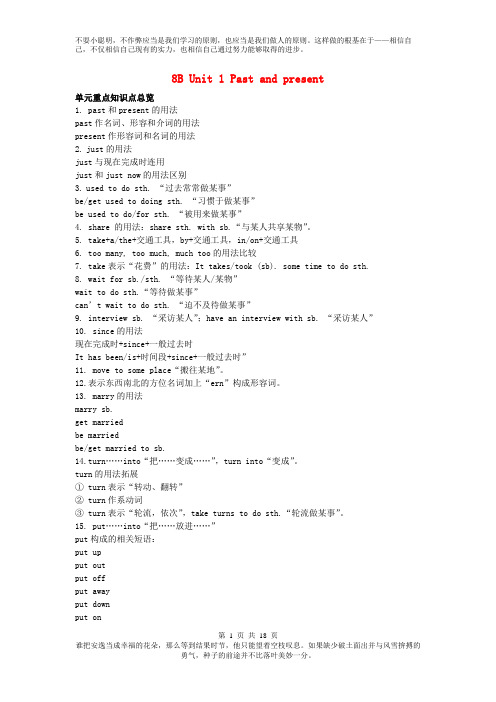
8B Unit 1 Past and present单元重点知识点总览1. past和present的用法past作名词、形容和介词的用法present作形容词和名词的用法2.just的用法just与现在完成时连用just和just now的用法区别ed to do sth. “过去常常做某事”be/get used to doing sth. “习惯于做某事”be used to do/for sth. “被用来做某事”4. share 的用法:share sth. with sb.“与某人共享某物”。
5. take+a/the+交通工具,by+交通工具,in/on+交通工具6. too many, too much, much too的用法比较7. take表示“花费”的用法:It takes/took (sb). some time to do sth.8. wait for sb./sth. “等待某人/某物”wait to do sth.“等待做某事”can’t wait to do sth. “迫不及待做某事”9. interview sb. “采访某人”;have an interview with sb. “采访某人”10. since的用法现在完成时+since+一般过去时It has been/is+时间段+since+一般过去时”11. move to some place“搬往某地”。
12.表示东西南北的方位名词加上“ern”构成形容词。
13. marry的用法marry sb.get marriedbe marriedbe/get married to sb.14.turn……into“把……变成……”,turn into“变成”。
turn的用法拓展① turn表示“转动、翻转”② turn作系动词③ turn表示“轮流,依次”,take turns to do sth.“轮流做某事”。
译林版牛津英语八年级下册Unit 1知识点+测试卷

Unit 1 Past and pastPart One Comic strip重点全解1、past and present.(P 6)① pastn. 过去,以前;in the past “在过去”adj. 过去的,以前的;in the past few years 在过去的几年里prep. 经过walk past the post office走过邮局② presentadj. 现在的; 目前的; 出席的n. 现在; 礼物; at present 现在;a present for you给你的礼物2、I’ve just eaten it..(P 6)just作副词,表示“刚刚”,通常与现在完成时连用。
just now意为“刚才”相当于a moment ago,通常和一般过去时连用。
例如:I have just heard the news.He left just now.3、You used to share food with me.(P 6)① used to do sth. “过去常常做某事”,暗含“现在不再”之意,后接动词原形,疑问形式可以直接将used提到句首,或者借助助动词did;否定式可以直接在used后面加not,或者用didn’t。
used to do sth. “过去常常做某事”I used to go to school by bus.be/get used to doing sth. “习惯于做某事”I am used to living here now.be used to do/for sth. “被用来做某事”② share 及物动词,意为“共享,共用”,常用结构为share sth. with sb.“与某人共享某物”。
例如:He shares a room with his twin brother.4、You used to be so kind to me.(P 6)kind“有好的,友善的”,be kind to“对……友好”。
八年级英语下册Unit1Pastandpresent复习提纲牛津版

Unit 1 Past and Present复习纲要1.in the bowl2.not any more3.transport at different times4.be in use/in service5.the changes to/in sp.6.interview sb.7.have an interview with sb.8.know very well9.since then10.move house11.in the southern part of town12.live together till/until 196513.get married14.move to another flat15. in th e center of town16.buy us a new flat17.buy a new flat for us18.over the years19.over/in the past 100 years20.in the past21.in the town center22.in the center of the town23.turn/chang e into24.at weekends25. play cards and Chinese c hess26.sth. is pleasant27.sb. is happy28.Th ere once was=There used to be29.shoe factoryed to do sth.31.dump its waste into the river32.the poison in the waste33. pollute the river34. realize the serious prob lem35.reduce the pollution36.be much cleaner37.in some ways38.open space39.move to other areas in Beijing40.feel a bit lonely- 1 -1 / 241.from time to timee back to see me43.a large area without building44.throw sth. away45.as well as46.as often as before47.see an exhibition48.forget the title49.over the past century50. learn a lot about Beijing’s past and present51.fly to Sanya=go to Sanya by plane52.stay there for a whole week53.enjoy the sun and the beach54. by the way55.in fact56.look like a real boat57.the best model I have ever seen58. a place of natural bea uty59.fresh air60.lend me a book=lend a book to me61.le arn from the book62.travel to and from town63.another big change64.move into new flats65.see the changes myself66.be in primary school67.take me to school68.don’t need to=needn ’t69.have more free time70.relax more71.have the same feelinge a dictionary73.be (not) far from sp.74. green hill s around75.bring many advantages76.cause many problems77.bring them a modern life78.a recent photo79.for a very long time80.a new tourist attraction- 2 -2 / 2。
Unit1PastandPresent的牛津版初二下册英语知识点总结
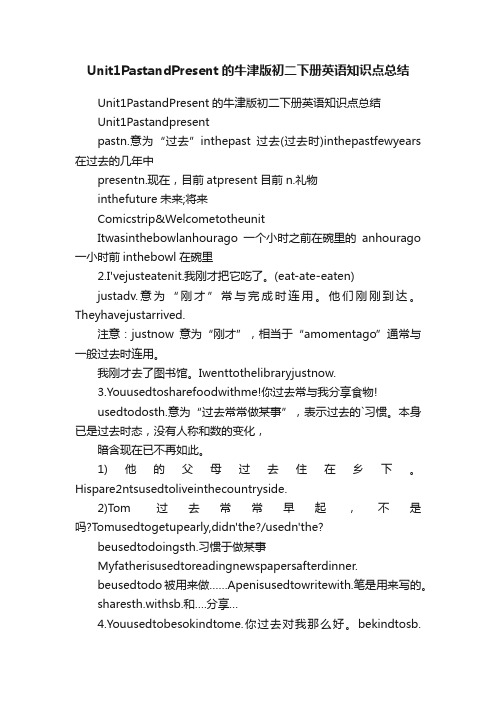
Unit1PastandPresent的牛津版初二下册英语知识点总结Unit1PastandPresent的牛津版初二下册英语知识点总结Unit1Pastandpresentpastn.意为“过去”inthepast过去(过去时)inthepastfewyears 在过去的几年中presentn.现在,目前atpresent目前n.礼物inthefuture未来;将来Comicstrip&WelcometotheunitItwasinthebowlanhourago一个小时之前在碗里的anhourago 一小时前inthebowl在碗里2.I'vejusteatenit.我刚才把它吃了。
(eat-ate-eaten)justadv.意为“刚才”常与完成时连用。
他们刚刚到达。
Theyhavejustarrived.注意:justnow意为“刚才”,相当于“amomentago”通常与一般过去时连用。
我刚才去了图书馆。
Iwenttothelibraryjustnow.3.Youusedtosharefoodwithme!你过去常与我分享食物!usedtodosth.意为“过去常常做某事”,表示过去的`习惯。
本身已是过去时态,没有人称和数的变化,暗含现在已不再如此。
1)他的父母过去住在乡下。
Hispare2ntsusedtoliveinthecountryside.2)Tom过去常常早起,不是吗?T omusedtogetupearly,didn'the?/usedn'the?beusedtodoingsth.习惯于做某事Myfatherisusedtoreadingnewspapersafterdinner.beusedtodo被用来做……Apenisusedtowritewith.笔是用来写的。
sharesth.withsb.和….分享…4.Youusedtobesokindtome.你过去对我那么好。
【2019-2020】八年级英语下册Unit1Pastandpresent词汇与语法基础训练新版牛津版
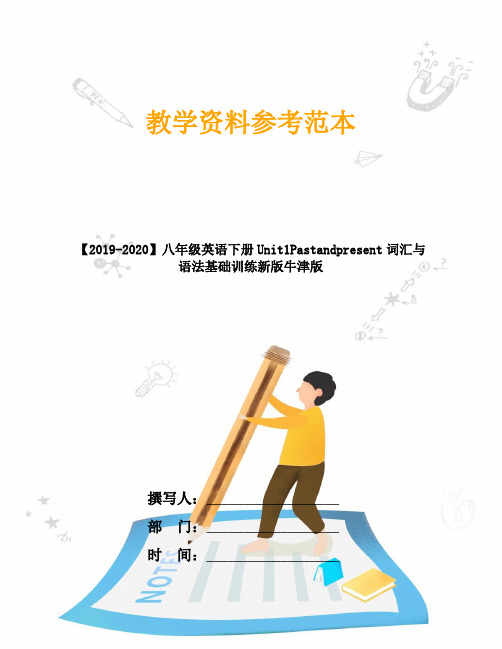
教学资料参考范本【2019-2020】八年级英语下册Unit1Pastandpresent词汇与语法基础训练新版牛津版撰写人:__________________部门:__________________时间:__________________一、必背词汇past n. 过去 adj.过去的present n. 现在,目前just adv. 刚才since conj. 自……以来 prep.自……以来ever adv. 曾经northern adj. 北方,北部的married adj. 已婚的,结婚的wife n.(pl. wives) 妻子block n.街区over prep. 在……期间pollution n. 污染;污染物factory n. 工厂waste n. 废料;废品realize (= realise )vt.& vi.意识到;实现improve vt.&vi. 改进,改善situation n. 形势,情况impossible adj. 不可能的before adv.以前,过去lonely adj. 孤独的,寂寞的anyway adv. 尽管,即使这样husband n. 丈夫interview n. 采访;会见yet adv. 还,仍recently adv.近来,最近environment n. 环境transport n.交通车辆,运输工具condition n. 环境,条件,状况return vi. 返回last adv.最近,上一次;最后abroad adv. 到(在)国外primary adj. 小学教育的;初级的communicate vt. &vi. 交流,交际exactly adv.(答语)正是,没错narrow adj. 狭窄的二、重点词汇1. present noun /ˈprez.ənt/1). something that you are given, without asking for it, on a special occasion, especially to show friendship, or to say thank you(尤指表示友谊或致谢的)礼物,赠品例句: They gave me theatre tickets as a present.他们送给我戏票作为礼物。
- 1、下载文档前请自行甄别文档内容的完整性,平台不提供额外的编辑、内容补充、找答案等附加服务。
- 2、"仅部分预览"的文档,不可在线预览部分如存在完整性等问题,可反馈申请退款(可完整预览的文档不适用该条件!)。
- 3、如文档侵犯您的权益,请联系客服反馈,我们会尽快为您处理(人工客服工作时间:9:00-18:30)。
8B Unit 1 Past and present单元重点知识点总览1. past和present的用法past作名词、形容和介词的用法present作形容词和名词的用法2.just的用法just与现在完成时连用just和just now的用法区别ed to do sth. “过去常常做某事”be/get used to doing sth. “习惯于做某事”be used to do/for sth. “被用来做某事”4. share 的用法:share sth. with sb.“与某人共享某物”。
5. take+a/the+交通工具,by+交通工具,in/on+交通工具6. too many, too much, much too的用法比较7. take表示“花费”的用法:It takes/took (sb). some time to do sth.8. wait for sb./sth. “等待某人/某物”wait to do sth.“等待做某事”can’t wait to do sth. “迫不及待做某事”9. interview sb. “采访某人”;have an interview with sb. “采访某人”10. since的用法现在完成时+since+一般过去时It has been/is+时间段+since+一般过去时”11. move to some place“搬往某地”。
12.表示东西南北的方位名词加上“ern”构成形容词。
13. marry的用法marry sb.get marriedbe marriedbe/get married to sb.14.turn……into“把……变成……”,turn into“变成”。
turn的用法拓展① turn表示“转动、翻转”② turn作系动词③ turn表示“轮流,依次”,take turns to do sth.“轮流做某事”。
15. put……into“把……放进……”put构成的相关短语:put upput output offput awayput downput onput back16.take action“采取行动”。
take action to do sth. “采取行动做某事”。
17.常见的修饰比较级的程度副词有much, even, any, a lot, far, rather, a little, a bit等。
18.in some ways “在某种程度上,在某些方面”。
way的相关短语总结on the wayin the wayby the wayon the/one’s way toin this/that waylose one’s way19.形式主语it和形式宾语it的用法。
20.形容词的否定前缀有un-,in-, im-, ir-, dis-等。
21. as……as before “和以前一样……”,as...as“和……一样”和not as/so...as...“不如……”。
22. a bit和a little的用法区别23. lonely和alone的区别24.because of和because的用法25.take place和happen的用法。
26.What’s sb./sth. like?What does sb./sth. look like?27.次数的表达28. already和yet的用法区别29. hear abouthear ofhear from30.plan to do sth.make a plan for语法:现在完成时(1)一、现在完成时的构成:have/has+done二、现在完成时的用法①表过去发生的某一动作对现在造成的影响或结果。
②表示从过去开始一直持续到现在, 也许还会继续下去的动作或状态。
三、常和现在完成时连用的时间状语already,yet,ever,never,just, before, up to now, so far, until now, in the past few years,for+一段时间,since+时间点。
31. borrow sth. from sb. lend sb. sth.=lend sth. to sb.32.return to some place;return sth. to sb.33. keep in touch with sb.; get in touch with sb.34. communicate with sb.; communication, have communication with sb.35. have fun; have fun (in)doing sth.36.through和across的用法37. spend+时间或金钱+(in )doing sth./on sth.38. on both sides of the road;on each/either side of the road单元重点短语归纳1.share sth. with sb. 和某人分享某物2.by underground 乘地铁3.be kind to... 对……友好4.wait for 等待5.be born 出生6.all one’s life 一生7.get married结婚8.since then 自从那时候9.turn……into 把……变成……10.in some ways 在某种程度上,在某些方面11.from time to time 有时,偶尔12.because of 因为13.hear about 听说14.in the past 在过去15.keep in touch with 和某人保持联系16.each other 互相,彼此17.go abroad 出国municate with sb. 和某人交流19.take place 发生20.have fun 玩得开心21.run through 流经22.play cards 打牌23.in the northern part of 在……南方24.live a.......life 过着……的生活25.on one’s own 单独,独自地26.move house 搬家27.move away 搬走28.living conditions 居住条件29.in one’s free time 在某人的空闲时间30.on both sides 在两边31.over the years 在这几年间句型归纳ed to do sth. 过去常常做某事2.It is +adj.+to do sth. 做某事是……的3.take action to do sth. 采取行动做某事4.It takes sb. some time to do sth. 花费某人多少时间做某事5.as+形容词/副词原级+as 和……一样……6.plan to do sth. 计划做某事7.hope+that从句希望……8.too many+可数名词复数太多9.spend...on sth. 在某方面花费……10.be/get used to(doing)sth. 习惯做某事8B Unit 1单元测试(A)卷一、短语翻译(每题1分,共10分)1、过去常常做某事2、发生3、结婚4、在某些方面5、和某人保持联系6、习惯做某事7、把…变成……8、采取行动9、互相10、有时候、偶尔二、单项选择(每题1分,共15分)( ) 1.---Where is Mr Green now ? I haven’t seen him for a few days.---He _____ to Hong Kong .A.goesB. will goC. is goingD. has gone( ) 2.-Excuse me, does Mr Smith’s son live here?-He _________ be here, but he has moved.A. has toB. used toC. tried toD. happened to ( ) 3.---Have you written anything on Chinese traditional food so far?---____, but I have a plan for it.A. Ever sinceB. Later onC. Not yetD. From now on ( ) 4. ---Why not go to see the dolphin show with me?---Because I _______ it.A. sawB. will seeC. seeD. have seen ( ) 5. ---______ he______ at this school last term?---Yes, I think so.A. Did, studyB. Has, studiedC. Was, studyD. Did, studied ( )6.The old man lives ____ in a _____ house, but he doesn’t feel_____.A.alone, alone, lonelyB. lonely, lonely, aloneC. alone, lonely, lonelyD. alone, lonely, alone( ) 7. great fun it is to fly in a balloon!A. WhatB. What aC. How aD. How( ) 8. I can’t buy this coat, because it is_____ expensive.A. muchB. a fewC. fewD. a bit( ) 9. ---Did you wash your clothes?---No, I was going to wash my clothes but I ____visitors.A. have hadB. haveC. hadD. will have( ) 10. ---Has your sister finished watching the new film_____?---Yes, she has finished it ________.A. yet, yetB. already, alreadyC. already, yetD. yet, already( ) 11. ---I am happy that she has time _________.---________________.A. relaxing more; I have the same feelingB. to relax more; I have the same feelingC. to more relax; I agree withD. relaxing more; I agree( ) 12.--- Excuse me, where is Mr Green's office?---Sorry, I don't know. I ___here for only a few days.A. workB. workedC. have workedD. will work( ) 13. Thomas Kate for two years, and they have a child.A.got married withB. has been married toC. married toD. married( ) 14. He ______a worker in a factory, but he______ a pop star two years ago.A. used to be; has becomeB. used to be; becameC. was used to be; becomesD. was used to being; has become( ) 15. My son up yet because he to bed very late last night.A. hasn’t got; has goneB. didn’t get; wentC. doesn’t get; wentD. hasn’t got; went三、完形填空(每题1分,共10分)(2013年广州市中考) One Saturday afternoon, Kate went to buy something for her sister and herself. As Kate was coming out of a __1__, a young lady walked towards her. She said she was Miss Green--a good friend of Kate’s sister’s. Kate __2__ her. Then she called a taxi to send Kate home. She told the driver where he should go. Kate was _3__ that it was not in the direction of her home.“Why?”Kate asked. The lady smiled.When they came to a quiet road, a big rough man ___4__ on the road. He stopped the taxi driver, knocked him down, tied him and threw him out of the taxi. At the same time, Miss Green took out a knife and __5__ Kate. She asked Kate to keep __6__. The man then started the taxi. “Oh, God! I’m being kidnapped.”Kate said to herself.She tried to escape, but not succeeded. Suddenly an __7__ came to her. She took out a lipstick( 口红)from her pocket, wrote “SOS”on the window, and covered the word with her __8__. A few minutes later, a police car passed and the policemen saw the __9__. When the kidnappers saw the policemen, they stopped the taxi, jumped into the grass, and ran away.The policemen then picked Kate up and sent her home. When her parents knew what had happened, they were greatly surprised. But they were also __10__ because their daughter had finally come back safely.( ) 1. A. school B. taxi C. shop D.friend’s( ) 2. A. knew B. believed C. thanked D. remembered ( ) 3. A. sure B. excited C. surprised D. pleased ( ) 4. A. drove B. climbed C. fell D. appeared ( ) 5. A. helped B. played C. saved D. frightened( ) 6. A. healthy B. alive C. relaxed D. quiet( ) 7. A. idea B. answer C. interest D. order ( ) 8. A. hands B. back C. dress D. lipstick ( ) 9. A. picture B. map C. sign D. knife( ) 10. A. worried B. happy C. afraid D. successful 四、阅读理解(每题2分,共30分)A(2011年徐州市中考) More and more people like bicycling and it is no surprise. It is fun, healthy and good for the environment. Maybe that’s why there are 1.4 billion bicycles and only 400 million cars on roads worldwide today. Bikes can take you almost anywhere, and there is no oil cost!Get on a bicycle and ride around your neighbourhood. You may discover something new all around you. Stopping and getting off a bike is easier than stopping and getting out of your car. You can bike to work and benefit (受益) from the enjoyable exercise without polluting the environment. You don’t even have to ride all the way.Folding (折叠) bikes work well for people who ride the train. Just fold the bike and take it with you. You can do the same on an airplane. A folding bike can be packed in a suitcase. You can also take a common bike with you when you fly. But be sure to look for information by getting on airline websites. Not all airlines are bicycle-friendly to travellers.Health Benefits of Bicycling:It helps to prevent heart diseases.A 15-minute bike ride to and from work three times a week burns off five kilos of fat in a year.心情).Exercise like bicycling has been shown to make people feel better, more relaxed and self-confident.( )1. From the passage, we know that bicycling is becoming very___________.A. surprisingB. excitingC. expensiveD. popular ( )2. When you are riding your bicycle around your neighbourhood, you may .A. pollute the environment aroundB. find something you didn’t noticeC. go everywhere and use a little oilD. get off your bike and begin to work( )3. If you travel with a folding bike, you can fold it and .A. get out of the carB. take it onto a trainC. put it in your purseD. go on airline websites( )4. One of the benefits from bicycling is that .A. you can fold the bicycleB. you will be friendly to othersC. you will be more relaxedD. you may get fatter and fatter( )5. Which is TRUE according to the passage?A. Bicycling is enjoyable exercise for people.B. Driving cars is healthier than riding bikes.C. Riding a bike pollutes your neighbourhood.D. Common bikes are welcomed by all airlines.B(2012年商丘市中考) British newspapers are much smaller than they used to be and their readers are often in a hurry, so newspapermen write as few words aspossible.They tell their readers at once what happened ,where ,when and how it happened and what was the result: how many people were killed,what change was done and so on. Readers want the fact(事实) set out as fully and accurately as possible. Readers are also interested in the people who have seen the accident. So a newspaperman always likes to get some information (信息)from someone who was there, which can be given in the person’s own words .Because he can use only a few words, the newspaperman must choose those words carefully, every one must be effective(有效). Instead of “he called out in a loud voice”, he writes” he shouted”; instead of “the loose stones rolled noisily down the side of the mountain”, he will write” they thundered down the mountainside”. Because many of the readers aren’t very clever, and most of them are in a hurry.( )6. From the text, newspapermen write as few words as possible, because readers__ _.A. want to know more about the newsB. take no interest in what has happenedC. have no time to read the news carefullyD. pay much attention to the result( )7.The underlined word “one” in the text refers to______.A.wordB.newspapermanC.readerD. person( )8. Which of the following would best complete the text ?A. he will keep his writing shortB. he won’t care about his writingC. he will give nothing but informationD. he won’t make his writing good enough.( )9. In what way do you think British newspapers have become smaller?A. In a page size.B. In number of readers.C. In number of pages.D. In number of copies( )10. Which of the following is true?A. Readers are not satisfied with the short news.B. Not many people have time to read the long articles in newspapers.C. Readers find the language of the newspapers exciting.D. Newspapermen try to report as fully as possible.C(2011年无锡市中考) Tom walked into a shop. It had a sign outside : "Second-hand (旧的) clothes bought and sold. "He was carrying an old pair of trousers and asked the owner of the shop, "How much will you give me for these?" The man looked at them and then said: "Two dollars.""What !" said Tom. "I had guessed they were worth at least five dollars.""No," said the man, "they aren't worth a cent more than two dollars.""Well," said Tom, taking two dollars out of his pocket. "Here's your money. These trousers were hanging outside your shop. The list price (标价)of them was six dollars and a half. But I thought that was too much money, so I wanted to find out how much they were really worth."Then he walked out of the shop with the pair of trousers and disappeared before the shop owner could think of anything to say .( )11. At first the owner of the shop thought that Tom __________ .A. wanted to steal the trousersB. wanted to sell the trousersC. wanted to fool himD. wanted to buy the trousers( )12. The owner of the shop_______ for the old trousers .A. would give Tom two dollarsB. would pay three dollarsC. would pay five dollarsD. would give Tom six dollars and a half ( )13. The shop owner insisted that the trousers were worth only two dollars because ____ .A. he wanted to sell them cheaplyB. he wanted to buy them cheaplyC. he didn't like the trousersD. they were old and dirty( )14. In fact, the trousers _________.A. were hanging inside the shopB. were stolen by Tom from the shopC. had been the shop owner'sD. had been Tom's( )15. From the story we know that _________ cheaper than the list price.A. the owner sold the trousers two dollarsB. Tom sold the trousers one dollar and a halfC. the owner bought the trousers three dollarsD. Tom bought the trousers four dollars and a half五、任务型阅读(每题1分,共10分)阅读下列短文,根据短文中的信息完成文后的表格(每空一词)When you are in England, you must be very careful in the streets because the traffic goes on the left. Before you cross the street, you must look to the right first and then the left. If the traffic lights are red, the traffic must stop. Then the people on foot can cross the road. If the lights are green, the traffic can go and people on foot mustn’t cross. In the morning and in the evening when people go to or come back from work, the streets are very busy. The traffic is the most dangerous then.When you go by bus in England, you have to be careful, too. You must always remember the traffic moves on the left. So you must be careful. Have a look first, or you’ll go the wrong way. In many English cities, there are big buses with two floors. You must sit on the second floor. From there you can see the city very well. That’ll be very interesting.1. 2. 3. 4. 5.6. 7. 8. 9. 10.六、用所给词的适当形式填空(每题1分,共15分)1. I am ______(surprise) at the news. What about you?2. When I passed the driving test, I thought I was the_____(luck) person in the world.3.The little boy is ______(kind) to his classmates, so nobody likes him.4. What do you think about the air __________(pollute) in your hometown?5. Danny and Daniel are brothers, and their_____(wife) are sisters. That’s interesting.6. I just (eat) some bread.7. Their family (move) to Nanjing two years ago.8. Nobody ___ (finish) the homework yet.9. The story___ (happen) many years ago.10. At night we can always see him ___ (study) in the room .11. What ___you ___ (do) while the others ___ (clean) the classroom?12. At the moment, who ___ (help) dad in the garden?13. Mr. Brown ___ (be) a soldier since 1984.14. They ___ (work)in this factory for twenty years.15. How long ___ you ___ (study) in this school?七、根据短文内容及首字母提示完成单词(每题1分,共10分)Dear Mark,I’m so glad that you will come to Nanjing during the holiday. You said you wanted to know something about t 1 in Nanjing. Well here is some advice on how to travel around Nanjing.The fastest way to come to Nanjing is by p 2 , of course. The airport is about twenty m 3 bus ride away from the downtown(市区). And you can get off at Xinjiekou. The underground in Nanjing has been in use s 4 2005.I wonder how long you will s 5 in Nanjing and what places you are i 6 in Maybe you want to travel around the city. It’s a good i 7 to hire a taxi. And the driver will tell you more a 8 the city. And you said you panned to go to Shanghai as well. You can go there by t 9 . The high-speed railway is very modern. And the trip from Nanjing to Shanghai will take less than two h 10 .1. 2. 3. 4. 5.6. 7. 8. 9. 10.8B Unit 1单元测试(B)卷一、短语翻译(每题1分,共10分)1、在某人空闲的时候2、和某人分享某物3、流经4、自从那时候5、在过去6、因为7、一生8、和某人交流9、放入10、对……善良二、单项选择(每题1分,共15分)( ) 1. ---Do you mind my sitting here?---___________.The woman sitting here has just left.A. You’d better not.B. Of course notC. Yes, pleaseD. No, you can’t( )2. They______ in Beijing when they_____ married.A. live, getB. lived, have gotC. lived, gotD. have lived, got( )3. Now, this small village_______ a big modern city.A. is turning intoB. turns intoC. has turned intoD. turned into( )4. After resting for a long time, Mr Green looks_____than before he left the hospital.A. unhealthierB. healthierC. more healthilyD. health( )5. The doctor looked him over and said there was_____ with her.A. nothing wrongB. wrong nothingC. anything wrongD. Wrong anything( )6. Sorry, I haven’t finished the work_____.A. alreadyB. beforeC. yetD. ever( )7. Mr Wu has worked here since his family to Nanjing five years ago.A. has movedB. movedC. movesD. move( )8. Look at that new model plane. It must_____ a lot of money.A. costB. payC. spendD. take( )9. Thanks to the cleaners, the environment_____ in our city recently.A. improvedB.improvesC. has improvedD. had improved( )10. Since he started high school, he’s come to school by bike_____.A. on his ownB. by his ownC. in his ownD. with his own( )11. You’re_____ late, the meeting has been over.A. terriblyB. nearlyC. terribleD. near ( )12. The fans are very sorry to hear that famous actor_____ for half an hour.A. has leftB. has been awayC. has goneD. has gone away( )13. ---I have bought a Chinese – English dictionary.---When and where_____ you _____ it?A. have, boughtB. did, buyC. will, buyD. do , buy( )14. ---What a nice T-shirt! How much did you_____ for it?---It_____ me twenty yuan.A. pay, costB. pay, paidC. cost, payD. cost, cost( )15. When you do eye exercises, you must keep your eyes_______.A. closeB. closedC.open D. closing三、完形填空(每题1分,共10分)(2012年深圳市中考) The Japanese Macaca monkey has been studied in the wild for over 50 years. In 1952, on one small Japanese island, scientists dropped some 1 in the dirt for the monkeys. The monkeys liked their taste, but they found the dirt 2 .One clever 18-month-old monkey found she could 3 the problem by washing the sweet potatoes in a nearby river, She taught this to her mother. Her 4 also learned this new way and they taught their mothers too.All the younger monkeys 5 learned to wash the dirty sweet potatoes to make them 6 to eat. But many of the adults found it very hard to learn this and still ate the 7 sweet potatoes.Then something very surprising 8 . In the autumn of 1958, scientists found that the monkeys on other nearby 9 began washing their sweet potatoes too. Scientists still don’t fully understand how this knowledge was 10 from one island to another.( )1. A. sweet potatoes B. green plants C. hard stones D.fresh nuts( )2. A. beautiful B. terrible C. difficult D. interesting( )3. A. find B. reach C. solve D. understand( )4. A. children B. brothers C. sisters D.friends( )5. A. quietly B. easily C. angrily D. awfully ( )6. A. nicer B. smaller C. lighter D.drier( )7. A. small B. large C. new D. dirty ( )8. A. took on B. took off C. took place D. took away( )9. A. trees B. islands C. beaches D. rivers ( )10. A. lost B. dropped C. passed D. left四、阅读理解(每题2分,共30分)A(2012年常州市中考) A man loved his son very much. Every day after work the man would come home and play with the little boy. One night, while the man was at work, he realized that he had extra(额外的) work to do for the evening, and that he wouldn’t be able to play with his son. But, he wanted to be able to give theboy something to keep him busy. Looking around his office, he saw a magazine with a large map of the world on the cover. He got an idea. He removed the map, and then patiently(耐心地) tore (撕) it up into small pieces. Then he put all the pieces in his coat pocket.When he got home, his son wanted to play with him, but he spread (铺) all the pieces of the map on the table. He explained that it was a map of the world, and that by the time his son could put it back together, his extra work would be finished, and they could both play. Surely this would keep the child busy for hours, he thought.About half an hour later the boy came to the man and said, “OK, it’s finished. Can we play now?” The man was surprised, saying, “That’s impossible. Let’s go and see.” And sure enough, there was the picture of the world, all put together, every piece in its place. The man said, “That’s amazing! How did you do that?” The boy said, “It was simple. On the back of the page was a picture of a man. When I put the man together, the whole world fell into place.”( ) 1. According to the passage, the father told the boy to play by himself because ______.A. he didn’t want to play with him any moreB. he didn’t love his childC. he had some extra workD. the boy didn’t need his father’s help( ) 2. What does the underlined word “removed” mean?A. 移动B. 撕下C. 搬掉D. 撕碎( ) 3. Why could the boy finish the “puzzle” so quic kly? Because __________.A. he was very interested in the map of the worldB. his father often played the game with himC. he wanted to play with his father as soon as possibleD. the picture of the man on the back of the page helped him( ) 4. The passage mainly tells __________.A. how father can make children busy for hoursB. how to keep children away from parentsC. people should think about things in some other waysD. parents should think of some good ways to train children’s ability( ) 5. Which is the best title?A. A world in puzzle.B. Father and son.C. An easy puzzle.D. Father’s creative(创造性的) idea.B(2013年扬州市中考) One day, a teacher was giving a speech to his students. He held up a glass of water and asked the class, "How heavy do you think this glass of water is?"The students' answers ranged from 20 g to 500 g. "It does not matter on the weight itself. It depends on how long you hold it. If I hold it for a minute, it is OK. If I hold it for an hour, I will have an ache in my right arm. If I hold it for a day, you will have to call an ambulance (救护车). It is exactly the same weight,but the longer I hold it, the heavier it becomes. "If we carry our burdens (负担) all the time, sooner or later, we will not beable to carry on, the burden becoming increasingly heavier. ""What you have to do is to put the glass down, rest for a while before holdingit up again. "We have to put down the burden sometimes, so that we can be refreshed and areable to carry on.So before you return home from work tonight, put the burden of work down.. Don't carry it back home. You can pick it up tomorrow.Whatever burdens you are having now on your shoulders, let it down for a momentif you can.( ) 6. The teacher brought a glass of water to the class because_________.A. he was very thirstyB. his arms were strongC. it was a good exampleD. he wants to share the water with students( ) 7. "A glass of water" in this passage referred to (指)_________.A. knowledgeB. the burdenC. the timeD. the money ( ) 8. According to the teacher, you may feel_________ if you put down the burden sometimes.A.more stressedB. much heavierC. more relaxedD. much happier( ) 9. This was a lesson about_____A. how to relax oneself in lifeB. how to solve a physics problemC. how to keep fit by drinking waterD. how to study well( ) 10. Which of the following statements is TRUE according to the passage?A.You could become heavier and heavier if you held a glass of water.B.All the students in the class knew the exact weight of the glass of water.C.The teacher had a good way of making his lesson clear and easy.D. All the students can understand the teacher’s lesson.C(2013年南昌市中考) A famous teacher was speaking to the students at our school.He began his lesson by holding up a ¥100 bill. Then he said to the three hundred students, “Who would like this ¥100 bill?” The students began to put up their handsat once.Then he said, “I am going to give this ¥100 to one of you, but first, let medo this.” He then made the bill into a ball. Then he said, “Who wants it now?”The hands went back into the air.“Well,” he said, “What if I do this?” and he dropped it on the floor and steppe d on it. He picked up the dirty, crumpled bill and said, “Who still wants it?” Hands went back into the air.“My friends,” he said, “you have learned a valua ble lesson today. No matter (无论) what I did to the money, you still wanted it because it did not go down in value (价值). It was still worth ¥ l00!”Many times in our lives, we are dropped, crumpled, and stepped on by the chances we take and the things that happen to us. We feel as if we are worth nothing. But remember, no matter what has happened to you, you will never lose your value: you are always valuable to those people who love you. Your value doesn’t come from what you do or whom you know, but WHO YOU ARE.You are special and valuable. Don’t ever forget it!( )11. Even though it was dirty, the money _______.A. still went up in valueB. was worth nothingC. didn’t go down in valueD. was still ours( )12. We are always valuable to the people _______.A.who pay usB. who call usC. who hate usD. who love us( )13. Your value doesn’t come from what you do but _______.A. who you knowB. who made youC. who you rememberD. who you are( )14. The sentence “Hands went back into the air” means “_______”.A. the students put up their hands againB. the students put down their handsC. the students put their hands behind their backs againD. the students put their hands in front of them( )15. Why did the famous teacher use a ¥100 bill at his lesson?A. Because he wanted to make the bill into a ball.B. Because he used to drop a bill on the floor and stepped on it.C. Because he was going to give the bill to one of his students.D. Because he wanted to make the students know what value was.五、任务型阅读(每题1分,共10分)(2011年盐城市中考) In classes, your teachers will talk about topics that you are studying. The information they provide will be important for you to know when you take notes. So you must be able to take good written notes from what your teachers say.Here are the three stages of taking notes and what you should do during each stage.1.Before ClassReview your notes you have taken before you come to class. This will be good。
